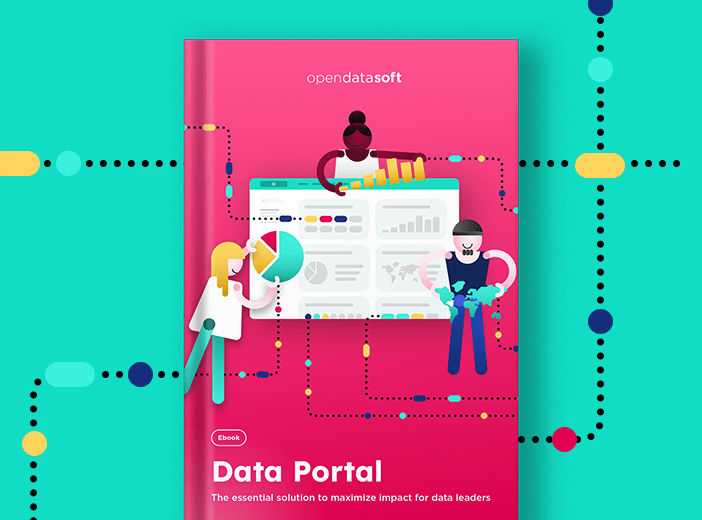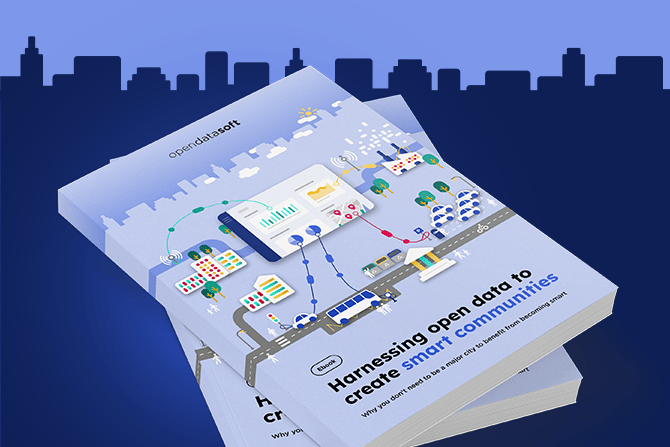How internal data portals benefit cities and municipalities
In a changing world, cities and municipalities need to provide seamless access to reliable, high-quality data to all employees if they are to meet their objectives around efficiency, improving the lives of residents, innovation and sustainability. We explain the importance of internal data portals to delivering on these needs.

Today cities and municipalities face a growing range of challenges. They need to innovate and be open to meet the changing needs of citizens and businesses, all while increasing efficiency, reducing costs, becoming more sustainable and boosting collaboration between departments.
Data is essential to meeting these objectives. While municipalities are collecting growing volumes of data from a wide range of business systems, Internet of Things (IoT) sensors and the internet, it is often hard to share information across the organization so employees can benefit from particular data assets. Information can remain trapped in departmental silos and even if it is available, employees don’t necessarily have the specialist data skills to understand and use data assets in their daily roles.
Internal data portals provide the answer. They deliver a centralized, one-stop-shop, bringing together all of the city’s data and making it available across the organization. Everyone can discover, understand and access data through an intuitive, easy to use interface that provides data assets in formats such as visualizations, dashboards and APIs.
5 benefits that internal data portals provide to cities and municipalities
Most cities and municipalities have launched open data portals to share information with the public, increasing transparency and efficiency. While employees can use these to access some data, many data assets will be too specialized to post on an open data portal or will contain confidential information accessible only by specific groups of staff. This is where internal-only data portals can deliver value.
Improve efficiency and drive cost savings
Municipalities need to focus on spending their budgets wisely, delivering value for money for taxpayers. Data sharing helps ensure they operate as efficiently as possible. That means ensuring that they are as efficient as possible. Making data available via data portals underpins the digitalization of processes, with users able to replace inefficient manual activities that involve re-entering information between systems with automated data sharing via APIs. As data is available to all, without requiring support from IT specialists, costs are reduced, while efficiency and agility are increased.
The planning department in the Town of Cary, North Carolina needs to run regular, multi-year reports based on census and other data. Previously teams had to compile this manually, but they now simply access relevant data from Cary’s portal, filter it for the right time period and then use it for reporting. This saves time, removes duplicate work and ensures consistency.
Data sharing via portals can also bring down IT costs. For example, the City of Long Beach in California publishes the latest information from its Go Long Beach 311 app on its portal, providing an interactive map and dashboard around citizen service requests. As staff can interact with data via the portal, the city doesn’t have to pay for additional licenses for the Salesforce software behind the app.

Enable better decision-making
Managers and elected officials at cities and municipalities have to make vital decisions that impact the lives of citizens and often involve multi-million dollar budgets. To do this they need access to complete, reliable and up-to-date information. Data portals therefore enable better decision making by centralizing information and making it available through interactive dashboards and visualizations, without requiring business analysts to run reports or provide support. As information is all in one place there is a clear audit trail behind why particular decisions have been made, thus meeting organizational rules and processes.
One of the key priorities for Leicester City Council in the UK is to address unemployment in the area. The council has a focus on jobs and skills so residents can secure better paid work with better conditions. To support this, Leicester’s unemployment dashboard within its internal data portal brings together information from the city and the UK Office of National Statistics (ONS) to provide a full picture of unemployment rates, broken down by criteria such as electoral ward, age, and gender. It enables Leicester to compare itself to other cities and areas, providing vital information to guide policy making by key decision makers in departments such as economic development.

Increase collaboration across departments
Cities cover an enormous range of services, from housing and parks to traffic management and business support. Consequently, staff in different departments may not interact closely with their colleagues in other offices or areas. However, to solve major challenges, from crime to sustainability, cities understand they need to take a collaborative approach that brings together teams from across departments and external partners. Data portals provide easy discovery and access to information from the entire city, in a single place. This makes it simple for employees to collaborate and re-use data in new ways.
The City of Salinas in California uses data as the foundation of its Community Alliance for Safety and Peace (CASP) program, a community initiative involving multiple groups to target youth and gang violence. This includes city departments responsible for Schools and Education, Law Enforcement, Social and Employment Services, Public Housing and Public Health. It uses data from across the city, such as on crime rates, socioeconomic information and school performance to structure the program, focus strategies and approaches, and monitor progress. The resulting data-driven program has reduced youth violence by over 60% in the last decade, helping build a stronger, more peaceful community.

Reduce risk and improve agility
Cities need to operate in a fast-changing world and manage their risk around everything they do, from financial performance to public health and achieving longer-term sustainability and air quality targets. Access to comprehensive data through a data portal provides a single source of truth for everyone within the organization, delivering the ability to better forecast and react to risks. For example, the City of Kingston in Canada now mandates that contracts with suppliers, such as around construction projects, include provisions to share relevant data on its internal portal, increasing accountability and providing greater oversight for city employees.
The Town of Cary shares data to reduce risk in a number of areas. It has carried out pioneering work to analyze wastewater across the municipality for traces of opioids, using this data to better target interventions. Due to its location at the heart of three river basins, Cary is prone to flooding from stormwater surges. To provide an early warning system and to predict flooding it has installed IoT water sensors and rain gauges across the town. The water sensors send alerts when levels hit a certain threshold, and the gauges provide minute-by-minute information on rainfall. This enables Cary officials to make faster, better informed decisions such as closing roads or greenways to reroute traffic which prevents drivers from encountering floodwaters.

Enable new innovations
Citizens and businesses expect their municipalities to be continually improving the experience and services that they provide, saving them time and meeting their changing needs. This requires internal innovation and collaboration, driven by data. Data portals deliver instant access for employees to the data they need to design new services that both improve internal performance and meet the requirements of citizens.
Based on the needs of its residents, Morrisville in North Carolina has created Morrisville Central, a new app that enables seamless engagement between residents, Town staff, and other groups. This is built on data, including lists of town amenities, road closures due to construction work, smart city data that shows the status of sports fields, occupancy of tennis courts, and how busy areas such as greenways and fitness centers are. By using data from the portal, information is always up-to-date – if it changes in the dataset, the app automatically updates in real time, ensuring consistency and removing the need for manual administration.
In the Town of Cary, the planning department takes monthly water samples to measure water quality. Rather than just keeping this dataset in its raw form, it is now available on Cary’s portal, where employees use it to build monitoring apps and dashboards via APIs. This includes a full size monitoring screen that displays information in the council’s offices.

Becoming a data-centric municipality through an internal data portal
To achieve their objectives, cities and municipalities need to focus on becoming more efficient, collaborative and innovative while managing risk and improving decision-making. Internal data portals provide the seamless access to information required to deliver on these aims, enabling all employees to easily interact and use data to effectively meet the changing needs of citizens and businesses.




